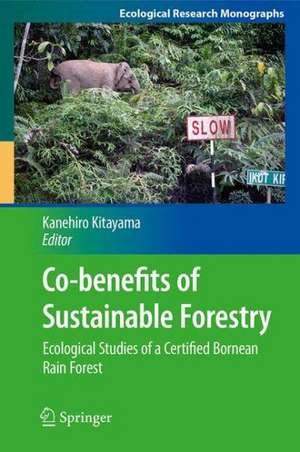Co-benefits of Sustainable Forestry: Ecological Studies of a Certified Bornean Rain Forest: Ecological Research Monographs
Editat de Kanehiro Kitayamaen Limba Engleză Hardback – 24 sep 2012
| Toate formatele și edițiile | Preț | Express |
|---|---|---|
| Paperback (1) | 938.83 lei 43-57 zile | |
| Springer – 15 oct 2014 | 938.83 lei 43-57 zile | |
| Hardback (1) | 946.55 lei 43-57 zile | |
| Springer – 24 sep 2012 | 946.55 lei 43-57 zile |
Din seria Ecological Research Monographs
- 18%
 Preț: 892.90 lei
Preț: 892.90 lei - 18%
 Preț: 947.50 lei
Preț: 947.50 lei - 15%
 Preț: 641.53 lei
Preț: 641.53 lei - 18%
 Preț: 1119.87 lei
Preț: 1119.87 lei - 18%
 Preț: 1235.08 lei
Preț: 1235.08 lei - 18%
 Preț: 1114.21 lei
Preț: 1114.21 lei - 18%
 Preț: 1123.35 lei
Preț: 1123.35 lei - 24%
 Preț: 772.24 lei
Preț: 772.24 lei - 24%
 Preț: 836.70 lei
Preț: 836.70 lei - 24%
 Preț: 833.35 lei
Preț: 833.35 lei - 18%
 Preț: 1116.26 lei
Preț: 1116.26 lei - 18%
 Preț: 1003.24 lei
Preț: 1003.24 lei - 15%
 Preț: 706.63 lei
Preț: 706.63 lei - 18%
 Preț: 1382.83 lei
Preț: 1382.83 lei - 15%
 Preț: 635.15 lei
Preț: 635.15 lei - 18%
 Preț: 937.09 lei
Preț: 937.09 lei - 18%
 Preț: 957.62 lei
Preț: 957.62 lei - 15%
 Preț: 651.99 lei
Preț: 651.99 lei - 18%
 Preț: 1231.47 lei
Preț: 1231.47 lei - 18%
 Preț: 964.71 lei
Preț: 964.71 lei - 20%
 Preț: 573.21 lei
Preț: 573.21 lei - 24%
 Preț: 938.23 lei
Preț: 938.23 lei -
 Preț: 362.99 lei
Preț: 362.99 lei -
 Preț: 328.42 lei
Preț: 328.42 lei - 24%
 Preț: 903.49 lei
Preț: 903.49 lei - 24%
 Preț: 1231.53 lei
Preț: 1231.53 lei
Preț: 946.55 lei
Preț vechi: 1154.34 lei
-18% Nou
Puncte Express: 1420
Preț estimativ în valută:
181.18€ • 196.87$ • 152.29£
181.18€ • 196.87$ • 152.29£
Carte tipărită la comandă
Livrare economică 21 aprilie-05 mai
Preluare comenzi: 021 569.72.76
Specificații
ISBN-13: 9784431541400
ISBN-10: 4431541403
Pagini: 176
Ilustrații: XII, 164 p.
Dimensiuni: 155 x 235 x 15 mm
Greutate: 0.48 kg
Ediția:2013
Editura: Springer
Colecția Springer
Seria Ecological Research Monographs
Locul publicării:Tokyo, Japan
ISBN-10: 4431541403
Pagini: 176
Ilustrații: XII, 164 p.
Dimensiuni: 155 x 235 x 15 mm
Greutate: 0.48 kg
Ediția:2013
Editura: Springer
Colecția Springer
Seria Ecological Research Monographs
Locul publicării:Tokyo, Japan
Public țintă
ResearchCuprins
1. Management history of the model site, the Deramakot and Tangkulap Forest Reserves.- by Robert C. Ong, Forest Research Centre, Malaysia and Andreas Langner, Kyoto University, Japan.- 2. The application of satellite remote sensing for classifying forest degradation and deriving above-ground biomass estimates.- by Andreas Langner, Kyoto University, Japan and Kanehiro Kitayama, Kyoto University, Japan.- 3. Management effects on tree species diversity and dipterocarp regeneration.- by Nobuo Imai, Kyoto University, Japan, Tatsuyuki Seino, Tsukuba University, Japan, Shin-Ichiro Aiba, Kagoshima University, Japan, Masaaki Takyu, Tokyo University of Agriculture, Japan, Jupiri Titin, Forest Research Centre, Malaysia and Kanehiro Kitayama, Kyoto University, Japan.- 4. Effects of reduced-impact logging on decomposers in the Deramakot Forest Reserve in Borneo.- by Motohiro Hasegawa, Forestry and Forest Products Research Institute, Japan, Arthur Y. C. Chung, Forest Research Centre, Malaysia, Tomohiro Yoshida, Tokyo University of Agriculture and Technology, Japan, Tsutomu Hattori, Forestry and Forest Products Research Institute, Japan, Masahiro Sueyoshi, Forestry and Forest Products Research Institute, Japan, Masamichi T. Ito, Surugadai University, Japan and Satoshi Kita, Kyoto University, Japan.- 5. Co-benefits of sustainable forest management for mammalian biodiversity.- by Hiromitsu Samejima, Kyoto University, Japan, Peter Lagan, Sabah Forestry Department, Malaysia and Kanehiro Kitayama, Kyoto University, Japan.- 6. Guidelines for establishing conservation areas in sustainable forest management - Developing models to understand habitat suitability for orangutans.- by Masaaki Takyu, Tokyo University of Agriculture, Japan, Hisashi Matsubayashi, Tokyo University of Agriculture, Japan,Nobuhiko Wakamatsu, Tokyo University of Agriculture, Japan, Etsuko Nakazono, Tokyo University of Agriculture, Japan.- 7. Co-benefits of sustainable forest management for carbon sequestration.- byNobuo Imai, Kyoto University, Japan, Jupiri Titin, Forest Research Centre, Malaysia, Satoshi Kita, Kyoto University, Japan, Robert C. Ong, Forest Research Centre, Malaysia and Kanehiro Kitayama, Kyoto University, Japan.- 8. Syntheses.- by Kanehiro Kitayama, Kyoto University, Japan.
Notă biografică
Kanehiro Kitayama, Professor of Forest Ecology, School of Agriculture, Kyoto University (Ph.D. in Botanical Sciences, University of Hawaii), authors of 75 peer-reviewed original papers.
Caracteristici
Thorough descriptions of biological communities in a tropical forest after logging A wide array of ecological approaches including ground, airborne, satellite, and modeling Provides support material for the ecological legitimacy of Forest Stewardship Council certification
















